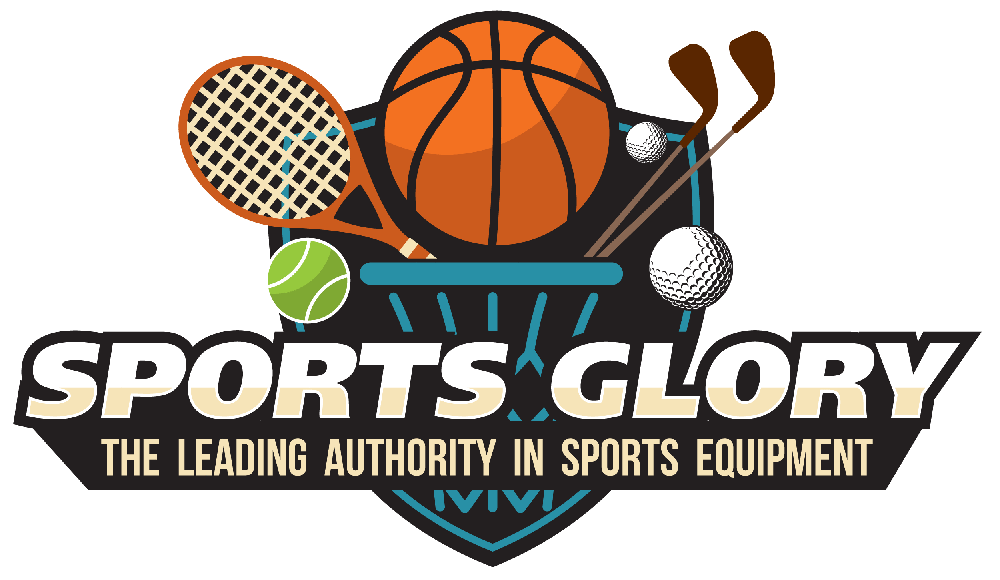“Practice makes perfect,” as the adage goes. And never has the expression been more accurate than with baseball, a challenging yet rewarding sport that takes eons of practice to perfect.
Although plenty of people practice their hitting game the old fashioned way—getting a real-life human to pitch every single ball—there’s a more reliable method to consider: the baseball pitching machine.
Capable of consistently delivering lightning-fast pitches for hours on end, these mechanized miracles are the ultimate accessory for anyone who dreams of hitting a home run. Many models even throw in a few curve balls and other sneaky plays, just as you’d expect in a real ball game.
Whether you’re an avid baseball enthusiast or a keen coach looking to enhance training efficiency, investing in a baseball pitching machine will help you succeed right off the bat.
And to help you understand the finer details of the device, we’ve put together an in-depth guide. We’ve also researched and reviewed the top baseball pitching machines on the market so you can pinpoint the perfect pitcher for you.
Batter up.
Contents
- Factors to Consider When Purchasing a Pitching Machine
- Top 10 Best Baseball Pitching Machines 2026
- 1. Best Overall Pitching Machine: Louisville Slugger Blue Flame Pitching Machine
- 2. Best Pitching Machine for Fielding Practice: SKLZ Catapult Soft Toss
- 3. Best Pitching Machine for Kids: Franklin Sports MLB Baseball Pop a Pitch
- 4. Best Budget Pitching Machine: Louisville Slugger Triple Flame Hand-Held Pitching Machine
- 5. Best Premium Pitching Machine: JUGS PS50 Baseball Pitching Machine
- 6. Best High-Capacity Pitching Machine: SKLZ Lightning Bolt Baseball Pitching Machine
- 7. Best High-Speed Pitching Machine: BSN Bulldog Baseball Pitching Machine
- 8. Best Pitching Machine for Rapid-Fire Batting: Heater Combo Pitching Machine
- 9. Best Pitching Machine for Small Balls: Jugs Small-Ball Pitching Machine
- 10. Best Professional Pitching Machine: ATEC M3 Baseball Pitching Machine
- Pitching Machines: Everything You Need to Know
- Baseball Pitching Machine FAQ
- What Is the Best Baseball Pitching Machine?
- What Pitching Machine Does the MLB Use?
- Do Pitching Machines Help Your Hitting?
- How Fast Does a Pitch Machine Throw?
- How Much Do Baseball Pitching Machines Cost?
- How Far Is the Pitching Machine From the Home Plate?
- Can a Pitching Machine Throw a Curveball?
- Can You Rent a Pitching Machine?
- Batter Up!
Factors to Consider When Purchasing a Pitching Machine
Not all baseball pitching machines are made equal; there’s a wide range of products out there with all sorts of different features. We’ve compiled a shortlist of the top things to consider when purchasing a pitching machine to simplify the decision-making process.
Speed
Although budget models might max out at 30 mph, top-end baseball pitching machines can hurl fastballs at a whopping 105 mph. Little league trainers and parents should aim for the lower-end, while big players need maximum speed.
Ball Type
Some baseball pitching machines are designed to hurl miniature, lightweight balls that won’t smash windows or unwittingly injure players. Of course, using bigger regulation size balls is the most life-like way to hone your game.
Throw Type
Are you happy to face fastballs all day long? Or would you prefer to throw a few sinkers and curveballs in the mix? Top-end machines can be programmed to pitch numerous unique throw styles to keep the batter on their toes.
Portability
The most elaborate baseball pitching machines are bulky and cumbersome, which isn’t ideal if you continuously move them around. Aim for something small and lightweight if portability is a high priority for you.
Power Source
Many baseball pitching machines require a 120V (standard domestic) connection to run. If you don’t have anywhere to plug in, consider a battery-powered or manually operated model instead.
With all of that in mind, it’s time to step up to the plate and take a look at our selections for the best pitching machines available today.
Top 10 Best Baseball Pitching Machines 2026
1. Best Overall Pitching Machine: Louisville Slugger Blue Flame Pitching Machine
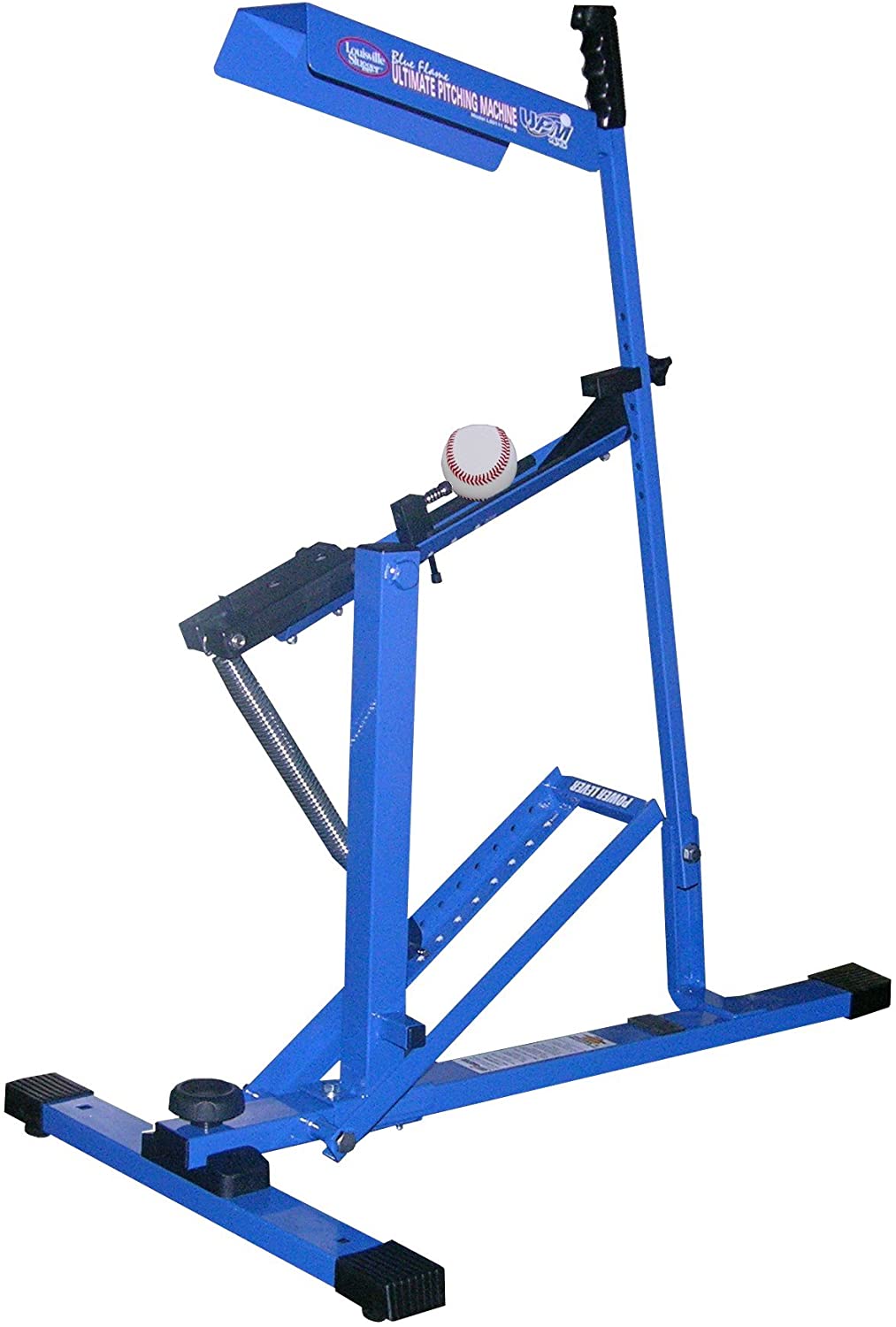
Editor’s Rating:
Quick Facts:
- Speed Range: 18-45 mph
- Ball Type: All baseball types, plus softballs, volleyballs, and soccer balls
- Throw Types: Fastballs, fly balls, grounders
- Power Source: Manual crank
- Dimensions: 32 x 14 x 6 inches; 24 Pounds
Although it might not be the ideal option for team practice, the Louisville Slugger Blue Flame is the perfect pitching machine for keen individual batters looking to up their game.
The big drawcard here is the manual-crank device doesn’t require any external power source, so you won’t need to worry about recharging batteries or plugging into an outlet. And that means parents can set up an impromptu batting practice session with the little ones wherever they please.
Of course, the manual crank design comes with its drawbacks, too. You’ll need to load each ball individually and crank the device before every pitch. Those extra steps take time, so it’s not ideal for coaches with a long line up of impatient batters awaiting their turn. It’s also not quite as fast as an electric-powered device, maxing out at 45 mph with a regulation ball or 60 mph with a plastic ball.
If you’re looking for something that can pump out pitch after pitch, you might prefer the professional-grade ATEC M3 Baseball Pitching Machine. But for your average home batter, this machine is probably the best bet.
One great feature of the Louisville Slugger is versatility—you can use it with soccer balls, volleyballs, softballs, and the like. Adjustable speed settings make it easy to tone up or down each pitch, and it works well for infield and outfield drills.
At 25 pounds, it’s relatively easy to lug around, and you can pack the whole thing down for storage in its original box.
- No battery or electricity required
- Pitches consistent fastballs
- Affordable solution for families
- Uses many other ball types
- Reasonably light and portable
- Requires manual cranking
- Only holds one ball at a time
2. Best Pitching Machine for Fielding Practice: SKLZ Catapult Soft Toss
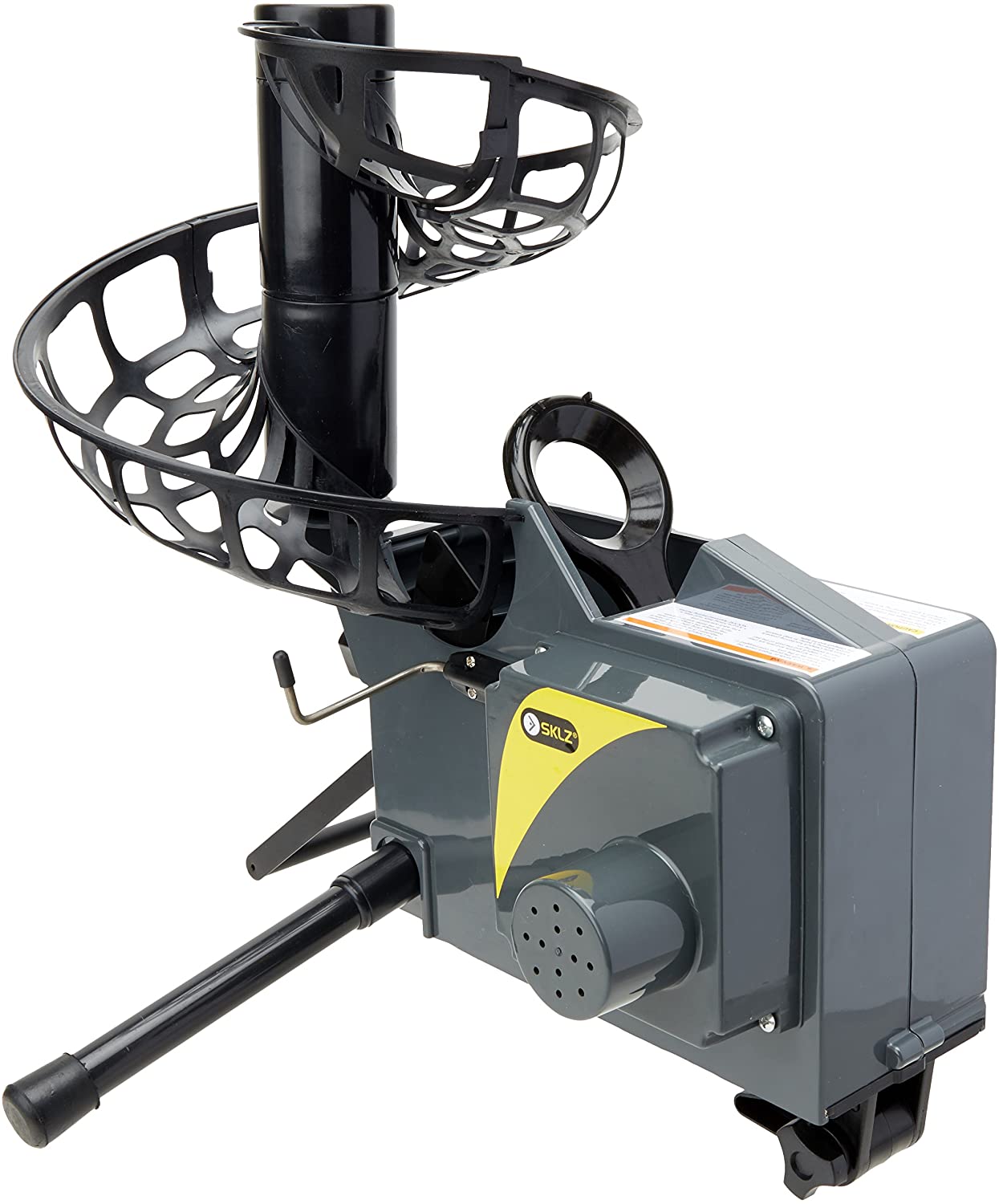
Editor’s Rating:
Quick Facts:
- Speed Range: Soft toss
- Ball Type: Regulation baseballs, practice balls
- Throw Type: Soft toss
- Power Source: 120V or battery operated
- Dimensions: 13.5 x 9.5 x 7 inches; 1 lb
It won’t make you a superstar batter any time soon, but the SKLZ Catapult Soft Toss excels at developing fieldwork skills—essential for anyone looking to improve their ball game overall.
The first thing to note here is it’s a soft toss machine; it’ll lob a baseball slowly into the air in an upward direction rather than pelt it horizontally as a regular pitching machine would. While a batter can use the arc to practice their swing, it’s a far cry from the real thing and not the ideal way to hone hitting skills.
And that’s why many players use this one to practice fieldwork—think glove-ball hand transfers, footwork, catching, pop-flys, and more. With a large spiral funnel canister capable of containing eight balls at a time, this rapid-fire machine gives you plenty of fast-paced practice. It tosses regulation sized baseballs into the air every eight seconds, so you’ll get through the lot in just over one minute. Although it’s not a deal-breaker, we’d prefer to see a bigger capacity as restocking every minute gets arduous after a while.
We love how this device can run on 4 D batteries in addition to being plugged in, a definite plus when you don’t have anywhere to plug it in. The adjustable catapult is simple to tinker with as well, letting you set up the perfect practice session without wasting much time.
On the downside, it’s made from polypropylene plastic, which tends to break if mistreated, so you’ll need to take good care of it.
Some players prefer to purchase this device to complement a regular pitching machine rather than replace it. If you’re more interested in improving field skills than batting prowess, it’s a top option to consider. Those with batting in mind above all else might prefer the Heater Combo Pitching Machine, though.
- Great for field practice
- Tosses balls every 8 seconds
- Works with regulation baseballs
- Can run on batteries
- Easily adjustable arc
- Not great for batting practice
- Plastic shell prone to breakage
- Requires regular refilling of canister
3. Best Pitching Machine for Kids: Franklin Sports MLB Baseball Pop a Pitch
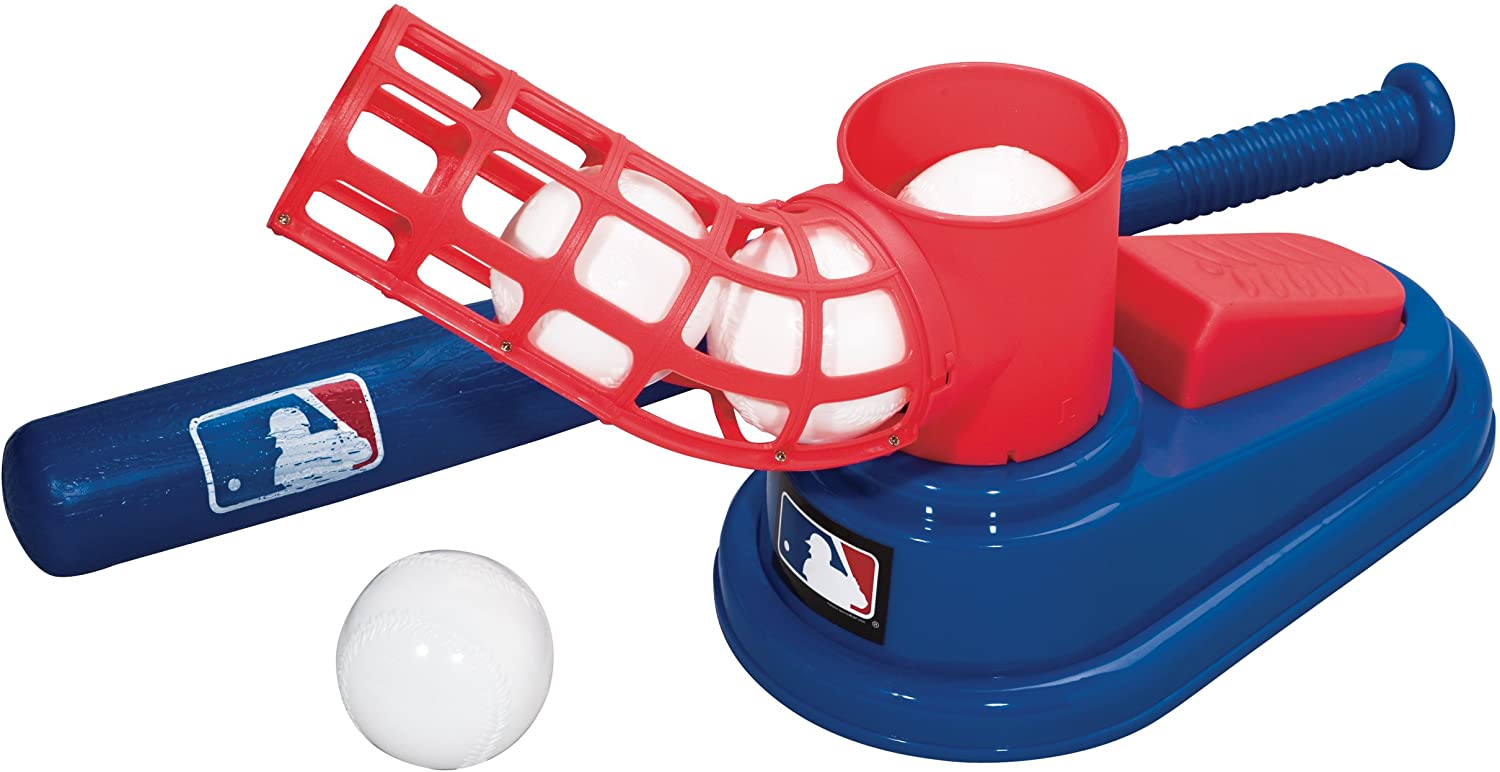
Editor’s Rating:
Quick Facts:
- Speed Range: Soft toss
- Ball Type: Plastic practice balls
- Throw Type: Soft toss
- Power Source: Manual crank
- Dimensions: 7.3 x 5.6 x 14.3 inches, 1.65 pounds
Keep the kids entertained and hone their hand-eye coordination at the same time with this child-friendly tossing machine.
Specially designed for toddlers and kids under 10, the tiny device has a steadfast focus on safety and fun. It’s easy enough for even the littlest batter to figure out—just step on the foot peddle, then stand back to whack the incoming ball. One of the standout features of the manual crank design is it doesn’t require batteries, so your little one can use it as often as they please.
The auto ball feeder takes three practice balls at a time, letting your child make the most of each practice session.
The ABS plastic set comes with an adorable 25-inch collapsible plastic bat and three lightweight practice balls. The balls are harmless enough to use inside the house, and you won’t have to worry about your tot snagging their fingers in any nasty metallic clamps.
Is it more of a toy than a proper baseball pitching machine? Perhaps—but it’ll give your kid a passion for the game from a young age. And that’s a winner in our book.
- Safe and fun for small children
- Fits up to three balls at a time
- Comes with balls and a collapsible bat
- Doesn’t require batteries
- Easy to use soft toss machine
- Not a proper pitching machine
- Not suitable for serious practice
- Only appropriate for small children
4. Best Budget Pitching Machine: Louisville Slugger Triple Flame Hand-Held Pitching Machine
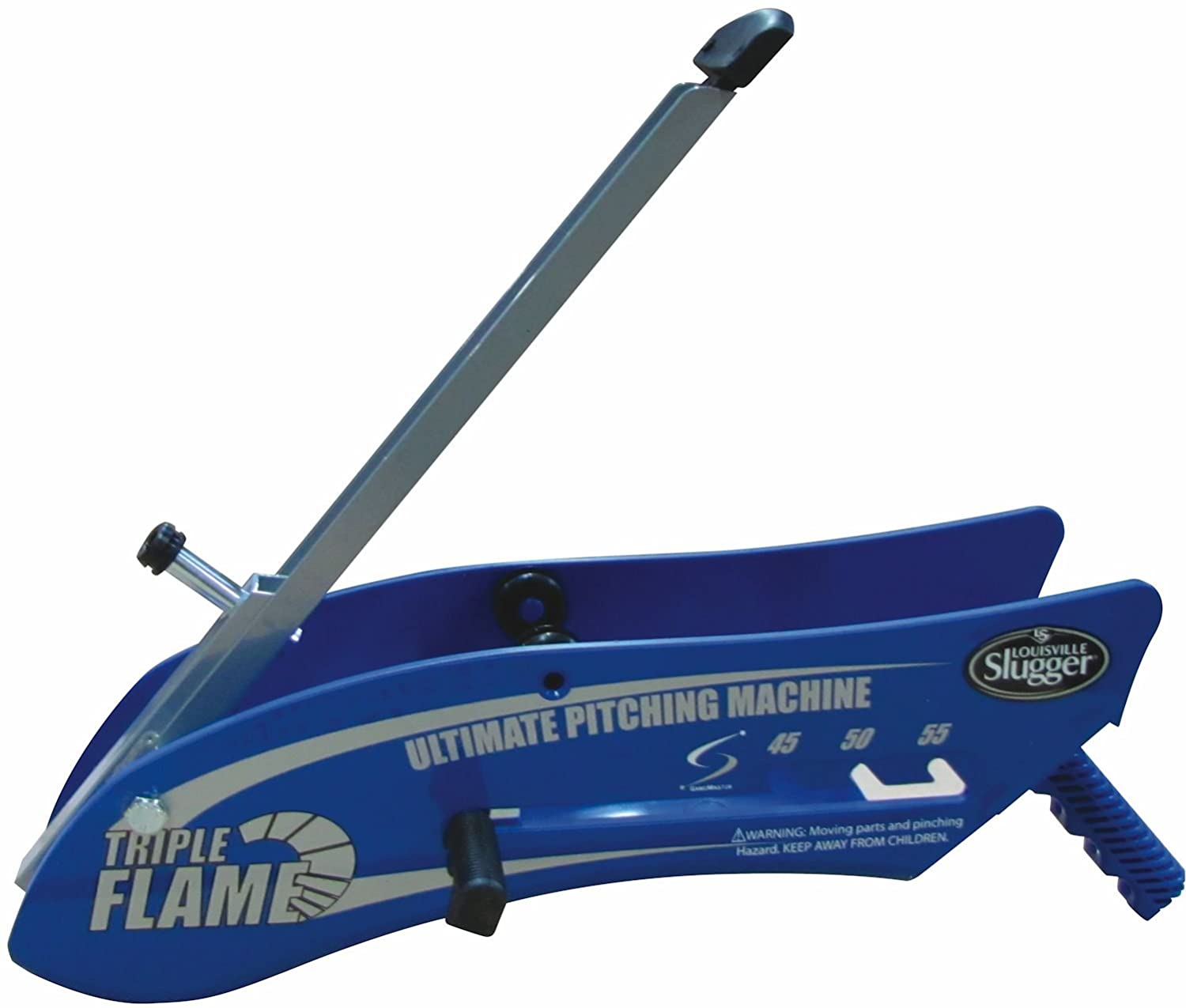
Editor’s Rating:
Quick Facts:
- Speed Range: Up to 30 mph
- Ball Type: Regulation baseballs, softballs, ultimate practice balls
- Throw Type: Fastballs
- Power Source: Manual crank
- Dimensions: 19 x 13 x 7 inches; 3.1 Pounds
Affordable and ultra-lightweight, this handheld pitching device from Louisville is perfect for cash-strapped parents seeking a cheap pitching machine for the kids.
The manual crank design takes one regulation ball at a time and pitches it up to 30 mph. Now that’s not particularly fast, which is why we only recommend this one for beginner players and younger kids. The good news is you can up the velocity using the practice balls, which it belts out at a more challenging 45-55 mph (these lightweight balls won’t leave bruises or break windows, either).
Coming in at about five times cheaper than Louisville’s flagship pitcher, the Blue Flame, it’s a cost-effective alternative for low-income families and underfunded community teams.
But the paltry price tag comes with a substantial catch: consistency, or lack thereof. Its lightweight frame tends to rock violently with each pitch, making it difficult to administer a consistent, steady throw.
For something to mess around with in the backyard, it’s brilliant value for money. But if you want to embark on extended practice sessions and truly hone your skills, you’d be better off investing in something more substantial.
- Extremely cheap
- Pitches practice balls up to 55 mph
- Lightweight and portable
- Great for young kids and beginners
- Suitable for backyard use
- Not stable enough for consistent training
5. Best Premium Pitching Machine: JUGS PS50 Baseball Pitching Machine
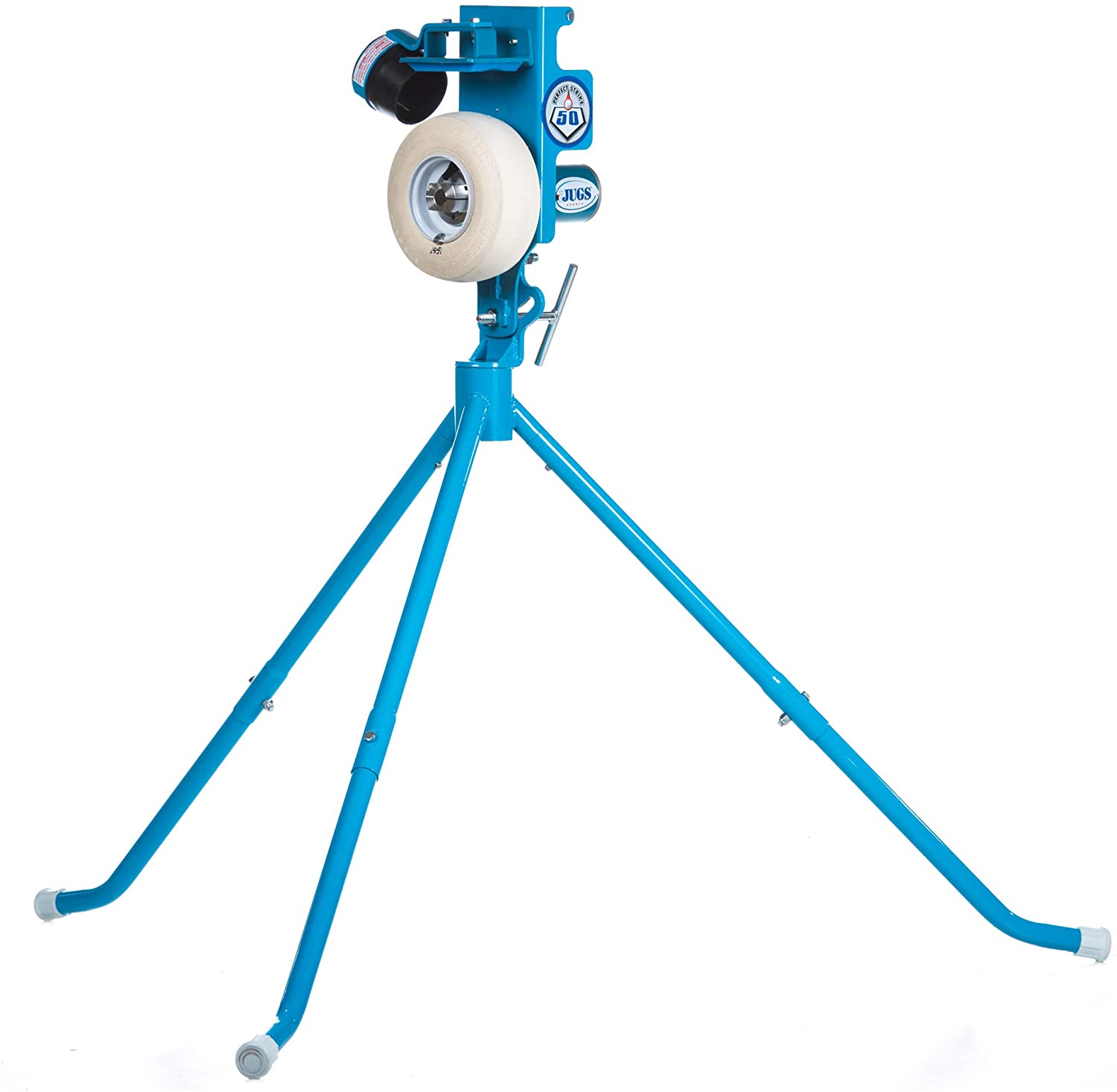
Editor’s Rating:
Quick Facts:
- Speed Range: Up to 50 mph
- Ball Type: Regulation baseballs, softballs, JUGS Sting-Free practice balls
- Throw Type: Fastballs, slow-pitch softballs
- Power Source: 120V
- Dimensions: 42 x 42 x 48 inches; 47 Pounds
Capable of hurling a dead straight fastball at 50 mph every time, the JUGS PS50 is a brilliant training accessory for home users and coaches alike.
The big advantage here over the Louisville Slugger Blue Flame is you won’t have to manually crank the contraption before each pitch, saving considerable time over a whole practice session. It delivers faster and more consistent pitches, too, making it an excellent choice for players who want to hone their game.
You’ll need to plug it in, so make sure you’ve got a long enough extension cord at hand. Coming in at 50 lbs., it’s rather bulky but not impossible to move thanks to its snap-shut legs and grip-and-go handle. Nonetheless, this setup is more suitable if you don’t plan on moving it around all that often.
It’s got a 12-inch chute for softballs (in addition to the 9-inch baseball chute) should you fancy switching up sports from time to time. It’ll also take JUGS Sting-Free practice balls if you’re worried about injuries on the pitch. Regardless of what you use, it’ll only take one ball at a time.
As a neat little extra, the device comes with a digital display that lets you know exactly how fast each pitch is going.
Although it’s pretty expensive for the home user, it’s a worthy investment for the parents of passionate pint-sized players. The device works well for adult-aged teams, too, as you can move it closer to simulate higher speeds than the standard 50 mph. If you want more power, check out the JUGS BP1 instead.
- Throws consistent high-speed pitches
- Handle and closable legs for easier carrying
- Digital display to see pitch statistics
- Baseball and softball compatible
- Only takes one ball at a time
- Fairly heavy
- Expensive for the home user
6. Best High-Capacity Pitching Machine: SKLZ Lightning Bolt Baseball Pitching Machine

Editor’s Rating:
Quick Facts:
- Speed Range: Up to 30 mph
- Ball Type: Soft practice balls
- Throw Type: Fastballs
- Power Source: 120V and battery
- Dimensions: 3.7 x 4.25 x 3.7 inches; 3.57 lbs.
Much like the Heater Combo, this rapid-fire machine is designed to pump out a plethora of pitches in quick succession. Each ball flies out of the machine in five-second intervals, and you can load up to 26 at once—compared to only nine in the Heater Combo. That gives you just over two minutes of intensive batting practice before you have to go pick up the balls, making it among the most rigorous contraptions on the market.
But while it belts out more balls for a longer timeframe than the Heater Combo, it’s not nearly as quick. The SKLZ Lightning Bolt pitches at a modest 30 mph, which isn’t going to be much of a challenge to high school-aged children and above. It also only does fastballs; no fieldwork drills or curveball simulations here.
At 30 mph, you can expect the ball to get some interference from the wind. The machine tends to sway a little with each delivery, too, which requires regular readjustment—consistency is not a strong point here.
Nonetheless, 30 mph is about what you’d expect for this machine’s low price point, which ranks among the cheapest on our list. It’s also super portable, coming in at a paltry 3.57 lbs. Plus, the fact it runs on both battery and while plugged in is undeniably convenient.
Only twelve soft Micro Bolt Balls come included in the deal; we recommend buying more to take full advantage of its quick-fire succession. Regulation-sized baseballs aren’t compatible with the device.
- Holds up to 26 balls
- Pitches every five seconds
- Cost-effective option
- Highly portable
- Can run on batteries
- Slow 30 mph top speed
- Inconsistent pitching
- Only includes 12 balls
7. Best High-Speed Pitching Machine: BSN Bulldog Baseball Pitching Machine
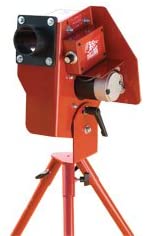
Editor’s Rating:
Quick Facts:
- Speed Range: 30 to 60 mph
- Ball Type: Regulation baseballs, softballs
- Practice Type: Fastballs, pop-flys
- Power Source: 120V
- Dimensions: 12 x 9 x 5 inches; 32 lbs
If speed is of the essence, it’s hard to go past the BSN Bulldog, a high-speed pitching powerhouse that delivers 60 mph balls with impeccable consistency. Although it does offer some fielding practice options such as pop-flys, it’s all about the batting practice with this beast.
We’d like to see more throw types included in the deal, as fastballs are the only batting option. Nonetheless, it does them better than most, especially considering the low price of the machine.
A nifty advantage to the Bulldog is its size. At a meager 32 lbs., it’s much easier to move around than other heavy-duty devices. Changing the velocity setting is super easy, and its extensive 30 to 60 mph range makes the unit suitable for young and old.
Like many high-speed pitching machines, it’ll cause severe wear and tear on regulation baseballs. Either accept you’ll have to replace them frequently or opt for the more machine-friendly McGregor dimple variety instead.
One thing we don’t love about this product is how much replacement parts cost. The price of a new wheel—which will wear out eventually—is almost half that of a brand new machine.
- Delivers fast and reliable pitches
- More portable than other high-end machines
- Easy to adjust velocity settings
- Suitable for pop-flys
- Only does fastball pitches
- Quickly degrades regulation balls
- Replacement parts are too expensive
8. Best Pitching Machine for Rapid-Fire Batting: Heater Combo Pitching Machine
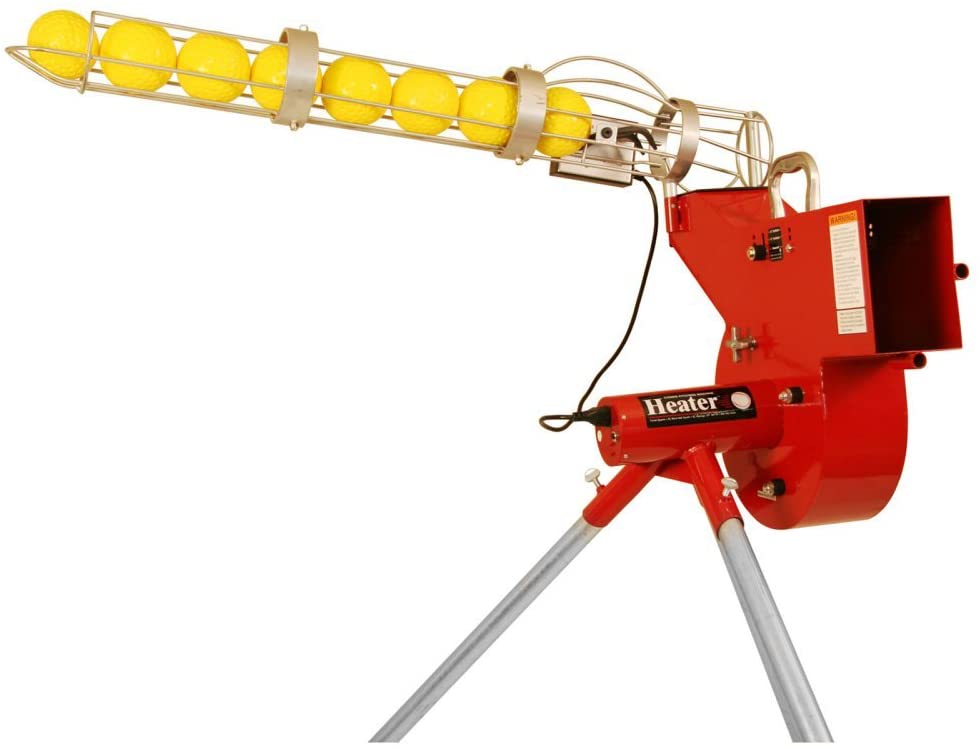
Editor’s Rating:
Quick Facts:
- Speed Range: Up to 60 mph
- Ball Type: Regulation baseball, softball, practice balls
- Throw Type: Fastballs, pop-flys, grounders
- Power Source: 120V
- Dimensions: 25 x 22 x 18 inches; 70 Pounds
The more swings you do per hour, the faster you’ll hone your hitting skills. And this rapid-fire machine from Heater Combo shoots out practice pitches at a rate of one every five seconds—you really don’t want any faster than that!
The unit has an extra-long canister that can hold up to nine regulation-sized balls at a time. This extended “ammunition” clip means you won’t waste your entire practice session crawling around on the floor looking for balls. You’ll spend more time hitting and become a better batter because of it.
Although it supports regulation-sized baseballs, they tend to warp over time, which means you’ll have to keep forking out for more over time. Another option is to use the more malleable lite balls (sold separately), specially designed to withstand the machine’s churning internal cogs.
The unit is adjustable for pitch height variations plus grounders and pop-flys, making it suitable for practicing both fielding and batting. The velocity variation dial is simple to use, and skilled players appreciate the 60 mph top speed setting.
It works just as well with softballs, but it’s a chore to switch from one setting to another as lots of fine-tuning is involved. The biggest downside is its size—at 70 lbs., you won’t be whisking it around town with ease.
- Large ball canister
- Rapid-fire pitching
- High top speed
- Efficient batting training device
- Suitable for grounders and top flys
- Chews up regulation-sized balls
- Tiresome to swap between softball/baseball mode
- Big and heavy
9. Best Pitching Machine for Small Balls: Jugs Small-Ball Pitching Machine
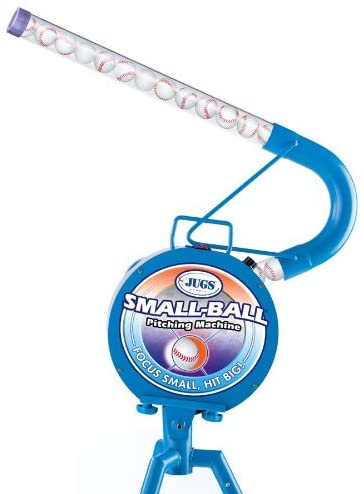
Editor’s Rating:
Quick Facts:
- Speed Range: Simulated 75 mph
- Ball Type: Small balls
- Throw Type: Fastballs, flys, ground balls, overhand curveballs
- Power Source: 120V
- Dimensions: 26 x 14 x 10 inches; 25 lbs
Although regulation-sized balls are the optimal way to train, there is an argument for practicing on smaller balls as well. With a narrow circumference to aim for, tiny balls help hone both depth perception and hand-eye coordination, an excellent complement to the real thing.
The balls in question are 5-inch polyurethane foam, about half the size of a regulation ball. As you only get three included in the pack, we strongly recommend you buy more as the machine can hold up to 25 at a time—that’s ideal for quick succession hitting.
Annoyingly, the balls are small enough to fit through the netting of most batting cages; you’ll need to keep a close eye on them. And while indoor garage use is viable, you run the risk of getting little red ink stains on the walls.
Feeding is done either automatically or manually, the latter involving an unwanted pitch height variation after each refill.
JUGS remain tight-lipped about the actual pitch speed, only stating it throws at a simulated velocity of 70 mph from a distance of 20 feet. The pace is adjustable through an in-built dial, and if you want to go a bit slower, it’s safe to move the machine back five feet or so without compromising consistency. Just be aware that every time you move the device, it messes with the stability, so you may have to realign it again.
A cool feature not found on many other pitching machines is the ability to throw overhand curveballs, which it pulls off with impressive accuracy.
- Good for depth perception
- Holds 25 balls at a time
- Suitable for fast succession hitting practice
- Able to pitch curveballs
- Not suitable for many batting cages
- Manual feeding can alter the pitch height
- Can only use small balls
10. Best Professional Pitching Machine: ATEC M3 Baseball Pitching Machine
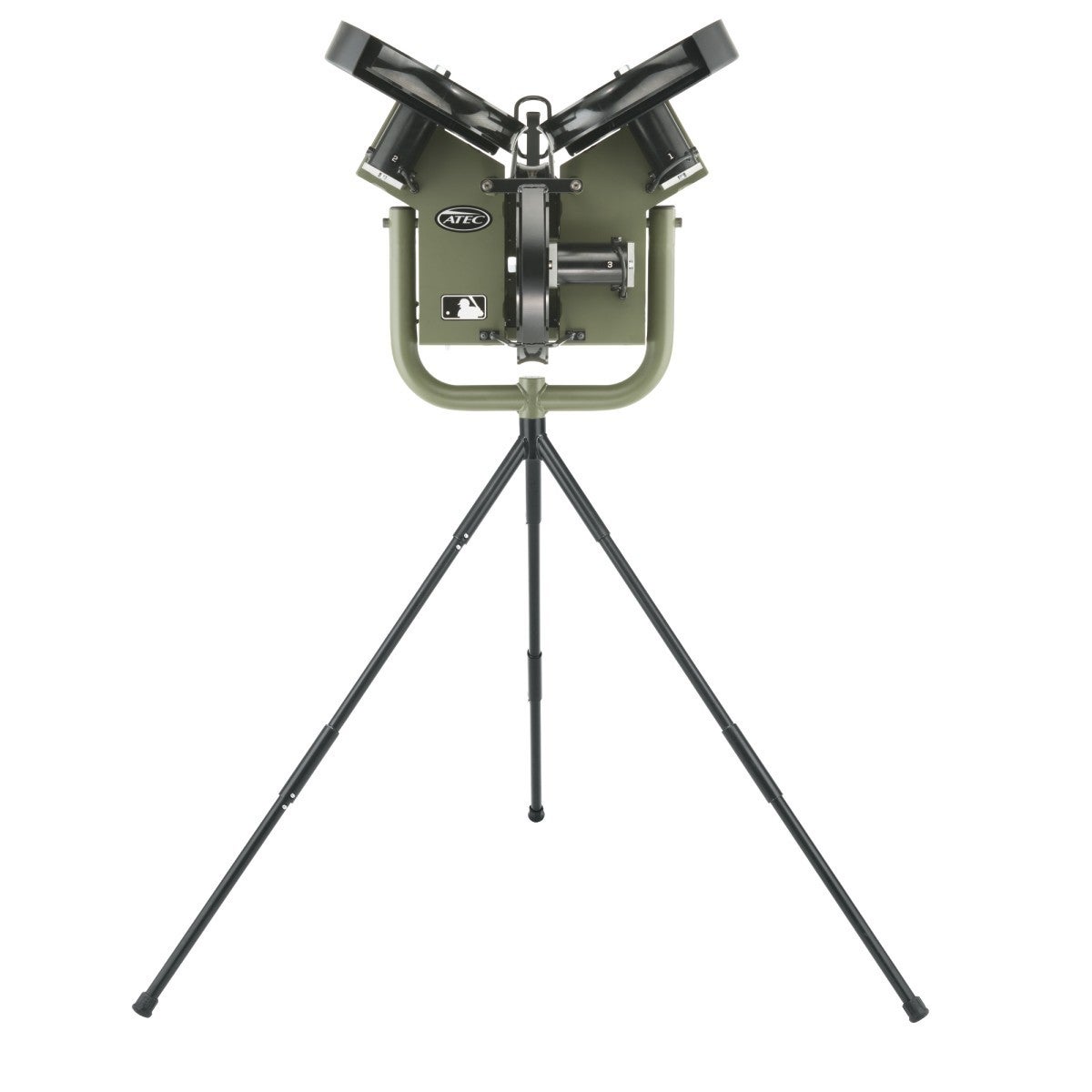
Editor’s Rating:
Quick Facts:
- Speed Range: 30-105 mph
- Ball Type: Leather, dimple, and foam
- Throw Type: Fastball, curveball, slider, splitter, knuckleball
- Power Source: 120V
- Dimensions: 130 lbs
Hoping to go pro? Then look no further than the ATEC M3, a juggernaut of a pitching machine built especially for the big leagues. It’s the official training aid of the MLB, and it’s got a price tag to match.
While other amateur pitching devices can throw fastballs and a couple of novel field exercises, this monster of a machine does sliders, curveballs, splitters, and knuckleballs with ease. And not only that, it belts them out at breakneck 105 mph—remember to wear your helmet and mouthguard.
It works wonderfully with regulation baseballs as well as dimple and foam. Adjustable speed and setting dials let you ramp up the velocity and switch between pitch styles on a whim. And the whole unit comes encased in a heavy-duty steel frame (130 lbs.) to eliminate recoil and optimize accuracy.
Put simply, it’s the best baseball pitching machine on the market, hands down. So why would we rank it on the lower end of our list?
It’s a simple matter of cost. Coming in at well over three grand a pop, the M3 is well beyond the reach of the everyday player–only hopeful pros and college players really need to splash out on one of these.
- Throws multiple pitch types
- Pitches at up to 105 mph
- Easy to adjust pitches and speed
- Heavy-duty frame is durable and doesn’t recoil
- Extremely expensive
Pitching Machines: Everything You Need to Know
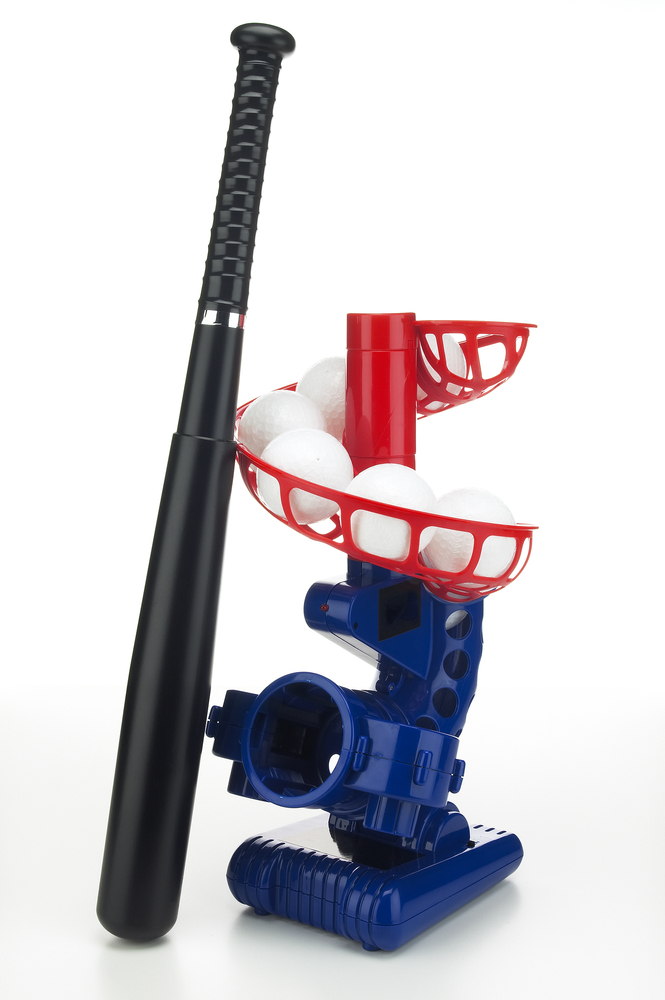
A baseball pitching machine is a considerable investment; you don’t want to strike out with one that’s not suitable for your needs. Your best bet is to play hardball with research and learn everything there is to know about the product right off the bat.
And that’s why we’ve put together this comprehensive Buyer’s Guide: you can step up to the plate with your product expertise and won’t face any surprises coming out of left field.
What Is a Baseball Pitching Machine and How Does It Work?
As the name suggests, it simulates the throw of a real-life pitcher. For the most part, the machine allows a batter to practice their swing, although it can be useful for fielding practice as well.
These nifty devices draw power from an outlet, batteries, or manual compression, then convert that energy through an ingenious ensemble of springs, wheels, or compressed air to deliver the perfect pitch.
Pitching machines come in an array of different shapes and sizes to suit all ages and abilities. Some require you to insert one ball at a time, while others let you load up a whole canister. The pitch type options and fielding drills vary depending on the product, with more expensive models offering more variety.
The Benefits of Using a Baseball Pitching Machine
Baseball pitching machines are bulky and cost a considerable sum—so are they worth it? We certainly think so, and we’ve compiled a list of the key benefits to show you why.
Non-Stop Pitching for Lengthy Practice Sessions
Even the most passionate coach will get a tired arm after a while; the baseball pitching machine lets the fastballs fly for hours on end. Another critical benefit is consistency—while even the best human players will inevitably pitch outside the strike zone, a machine will hit the same spot all day long.
The Coach Can Focus on Other Things
As a coach isn’t required to stand on the mound for every ball, they can dedicate attention to individual player techniques. Whether it be showing the batter how to improve their swing or getting the fielders into the ideal formation, a pitching machine frees up resources to optimize each practice session.
The Batter Can Practice on Their Own
Plenty of little leaguers and amateur adult batters would be out there honing their skills every day if they only had someone to pitch for them. A pitching machine takes the human requirement out of the equation to allow keen batsmen to practice independently and to their heart’s content.
Improving Your Defensive Game
Pitching machines aren’t just for the benefit of the batter; they allow fielders to get some much-needed practice in as well. The top-end models can simulate things like groundballs, fly balls, pop-ups, and long line drives, giving the fielders chance to hone their response time and skills.
Different Pitch Types
Top-end pitching machines aren’t only capable of belting out turbo-charged fastballs; they can deliver a wide range of tricky throws as well. The ability to play against various pitch types—curveballs, sliders, screwballs, etc.—makes for a well-rounded batter with a better chance of success.
The Baseball Versus Softball Pitching Machines: What’s the Difference?
Although both machines are designed to essentially do the same thing—throw a ball at a batter—there’s a substantial difference between the two.
As the ball is thrown overarm, baseball pitches come in at a downward angle. Softball, on the other hand, is pitched in more of an upward angle, and the machine simulates this accordingly. The baseball pitch is, on average, delivered much faster than in softball, so the machine needs to be capable of reaching a higher velocity. And finally, baseballs are substantially smaller than softballs (9-inch versus 12-inch circumference).
Although the pitching machines we review in this article are designed for baseball practice, some are suitable for softball too. We don’t review any products designed for softball but not baseball.
Baseball Pitching Machines: The Key Features to Consider
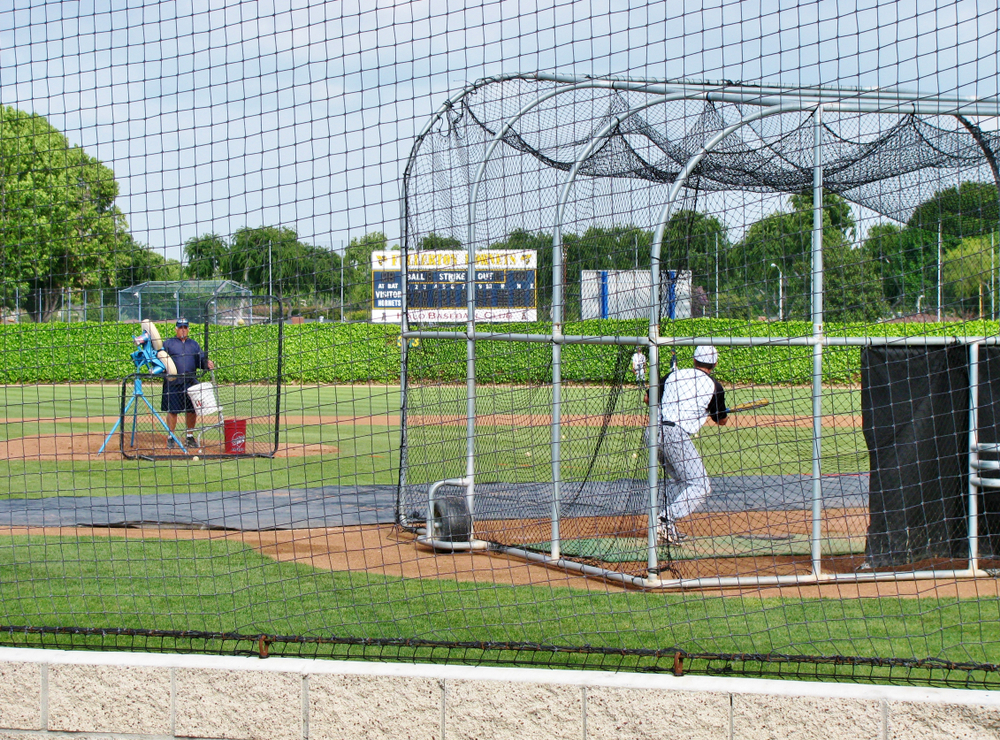
In this section, we’ll provide in-depth information on what you need to consider when purchasing a baseball pitching machine.
Pitching Speed
When looking at the ideal pitching speed range, it’s important to consider who will be using the machine in terms of both age and ability.
Grade school batters need time to focus on their technique; thus, a relatively slow 30-50 mph speed is ideal. However, not every child on the team is going to play at the same level. A seasoned coach knows to turn down the velocity for the less-coordinated kids, giving them a better opportunity to improve their swing.
Try the SKLZ Lightning Bolt Baseball Pitching Machine for grade-school aged players. High school batters are bigger, stronger, and have better hand-eye coordination, making them capable of smashing back balls at a speed of 50-80 mph. The BSN Bulldog Baseball Pitching Machine is awesome for high schoolers.
Anything above 80 mph is pretty quick and only really useful for training talented batters in their college years or above. Hard-hitting adults would love the ATEC M3 Baseball Pitching Machine.
If your preferred pitching machine isn’t fast enough (few can pitch above 60 mph), there’s a neat trick you can employ: move it closer to the batter. It won’t make the machine pitch faster, but as the ball travels less distance, the batter will have less time to respond, making it feel faster.
To fine-tune your desired speed, divide the normal pitching distance (60 feet in MLB) by your new, shorter distance (say, 46 feet), then multiply the result by the mph. For example, a ball thrown at 70 mph from 46 feet will feel like 91 mph from 60 feet (60×46=1.30 / 1.30×70=91).
Fun Fact: Aroldis Chapman set the world speed pitching record in 2010 at a blistering 105.1 mph (you probably don’t want to emulate that kind of speed!).
Power Source
Many of the best baseball pitching machines—and most of our recommendations—are powered by a 120V electrical connection. Although it’s the ideal setup as you’ll never run out of juice, the disadvantage is you need to have somewhere to plug it in. Many players and coaches purchase an extension cord to connect it to the clubhouse or another nearby power source—be sure to check it’s long enough, and the output will be accessible when you need it.
The JUGS PS50 Baseball Pitching Machine is one of our favorite plug-in powered devices.
Battery-Powered Pitching Machines
Battery-powered pitching machines are another excellent alternative when there’s no reliable 120V output nearby. Depending on the battery in question, you’ll typically get sufficient power to run the machine for several hours at a time, enough to last a whole training session. On the downside, batteries add to the overall cost and need to be recharged before each use, often overnight.
The SKLZ Lightning Bolt Baseball Pitching Machine is a top choice when you want to use batteries as a backup.
Manual Pitching Machines
Another common alternative is the manual, spring-loaded pitching machine. With these, the operator must wind up every pitch, making the task more laborious and time-consuming. On the plus side, you can use it anywhere you want as there’s no need for electricity or batteries.
Our top-rated manual crank pitching machine is the Louisville Slugger Blue Flame Pitching Machine.
Portability
Portability should only be a key consideration if you regularly need to move the pitching machine from one venue to another.
If you’re planning on doing all your pitching in the same ballpark, you could keep a cumbersome machine locked away in the clubhouse and drag it onto the field as needed. Even the bulkiest pitching machines are easy enough to move short distances with help from the players.
If you need to move it between various venues, you’d be better off going for a compact and lightweight model. Aim for something that fits into the trunk of a normal-sized sedan and is light enough for one person to carry—the coach won’t always have help on hand.
The Louisville Slugger Triple Flame Hand-Held Pitching Machine is an ultra-light option.
Many pitching machines come with wheels or carry bags for added portability.
Ball Type and Canister Size
The best way to get better at batting—or anything, for that matter—is to practice in real-world conditions. For that reason, the top baseball pitching machines are designed to work with regulation-sized horsehide or cowhide balls (9-inch circumference). These allow the batter to hit a ball of identical size and weight to those of the MLB.
However, regulation balls aren’t ideal in all situations. As they’re rather heavy (5 ounces), they tend to smash windows and injure players when walloped at whopping speeds. Also, many high-velocity pitching machines can damage regulation-sized balls, which means you’ll repeatedly need to shell out for more.
If these are deal breakers for you, opt for a pitching machine that’s compatible with a smaller and safer ball type instead. Safety, Reduced Injury Factor (RIF), and Youth Tournament Baseballs are viable alternatives for different age groups.
Another common type is the soft and synthetic practice baseball. Although safe and inexpensive, these aren’t compatible with all pitching machines as their weak exterior tends to gum up the internal cogs. However, many manufacturers sell practice balls specially designed for their own pitching machines.
Finally, the small ball is another option to consider. Roughly half the size of the regulation ball, these tiny baseball substitutes are designed to hone depth perception and improve hand-eye coordination. On the downside, they’re so small they tend to fly through the holes in a regular batting cage, making them easy to lose.
The Jugs Small-Ball Pitching Machine is our favorite small ball pitching machine.
Baseball pitching machines have a limited holding canister, anywhere from one to 24 balls. If you need rapid-fire succession in your practice sessions, aim for the upper end.
The SKLZ Lightning Bolt Baseball Pitching Machine holds up to 26 balls at a time.
Throw Types
Almost baseball pitching machines can produce the ubiquitous fastball, a straight-laced fast-shooter that’s the most common pitch type on the field.
But while the fastball is the most prevalent pitch type, it’s far from the only one. Skilled players can throw cutters, splitters, sliders, curveballs, changeups, and a dizzying array of other pitches. Only the best machines know how to emulate these.
The ATEC M3 Baseball Pitching Machine has the broadest range of pitch types.
For casual players or youth team coaches, investing in a fast ball-only device will probably be enough. But if you’re looking to compete or coach at the semi-professional level or above, you’ll need to practice these tricky pitches as well.
Soft Toss Training
Soft toss pitching machines throw the ball in and upwards arc instead of horizontally; they’re suitable for young children or players looking to develop field skills.
The Franklin Sports MLB Baseball Pop a Pitch is a fantastic soft toss machine for children.
Fielding Training
Many pitching machines can help players practice their fieldwork in addition to batting prowess. Features such as fly-pops and grounders are common inclusions and help develop a more well-rounded player.
The SKLZ Catapult Soft Toss is your best bet for developing fieldwork skills.
We mention what particular throw types and fieldwork skills each machine can produce in our Quick Facts section.
Baseball Pitching Machine FAQ
Still have a few questions about baseball pitching machines? There’s a good chance we’ve covered them in our FAQ.
What Is the Best Baseball Pitching Machine?
Although the ideal option depends on your objectives, requirements, and budget, we rate the Louisville Slugger Blue Flame Pitching Machine as our favorite overall. Easy to use and excellent value for money, it’s a widely accessible option that works like a charm for most players—and it doesn’t require batteries or a 120V connection.
What Pitching Machine Does the MLB Use?
Major League Baseball teams prefer the ATEC M3 Baseball Pitching Machine, a high-end option designed especially for elite level players. It doesn’t come cheap, but it’s an excellent choice when money is not an object.
Do Pitching Machines Help Your Hitting?
Yes, if used consistently. A pitching machine gives players the freedom to practice as long as they please, negating the need to rely on someone else to lend a helping hand. As the machines are remarkably consistent, they’re also helpful in overcoming the fear associated with a high-speed pitch.
How Fast Does a Pitch Machine Throw?
The exact velocity depends on the machine in question. Upmarket models can pitch at 105 mph, while cheaper ones might top out at 30 mph. If a top speed isn’t fast enough, you can always try moving the pitcher closer to the batter to make it feel faster.
How Much Do Baseball Pitching Machines Cost?
As a ballpark figure, baseball pitching machines range from $30 for a child-friendly cheapie to three grand or more for an MLB-rated rig. Peruse our Top Recommendations to find an option that aligns with your budget and requirements.
How Far Is the Pitching Machine From the Home Plate?
To optimize velocity, most pitching machines don’t allow for the standard regulation distance of 60 feet. The ideal distance varies but usually lies somewhere between 30 and 60 feet.
Can a Pitching Machine Throw a Curveball?
While not all baseball pitching machines know how to throw special pitch types such as curveballs, the more advanced models do. We recommend a couple of options that include this functionality—keep an eye on the Quick Facts section.
Can You Rent a Pitching Machine?
Various sporting goods retailers around America rent out pitching machines for an hourly rate. However, as rental costs are often astronomical, many people prefer to invest in their own.
Batter Up!
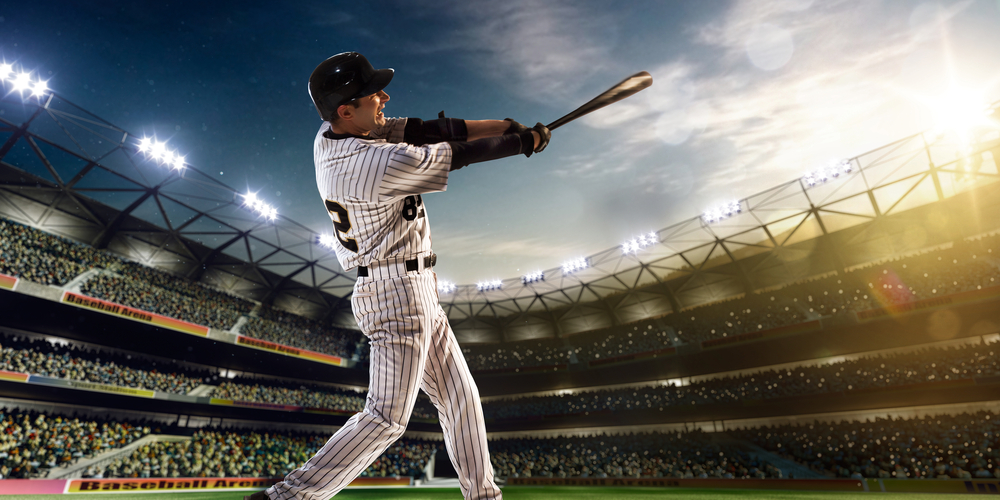
Now you’ve reached the end of our in-depth guide, you’re on the ball in terms of baseball pitching machine expertise—it’s time to head out and hit a home run for the team.
Take the time to review our factors to consider again before perusing our recommendations and deciding on the ideal product for you. With persistence and plenty of patience, it won’t be long before you’re hitting it out of the park, all thanks to the practice you’ll acquire from one of these baseball pitching machines.
